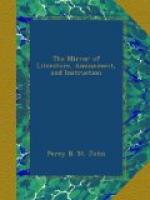(Starting from Bussorah, the author is towed up the Euphrates as follows.)
As soon as we had got out of the creek, we found both wind and tide had set against us. The mallahs, or trackers, immediately stripped, placing their clothes on their heads, and sprang on shore. A rope was passed from the mast-head to a girdle round their respective bodies, and off they set along the banks; sometimes, on reaching creeks, irrigating channels, or unequal projections, plunging up to their necks, and wading or swimming with their burthen, as the depth or shallowness of the water required. In this way all the communication up the Tigris and Euphrates is carried on when the wind blows down those rivers. The business of tracking as may be conceived, is extremely fatiguing and dangerous: in fact, so excellent a test does it furnish of the muscular powers and courage of man, that the heads of the Mallah tribes require that each Mallah should make three trips to Bagdad, as a tracker, before he can be qualified for the married state and the care of a family.
(The plague rages at Bagdad, and he returns to Bussorah. On his way he escapes a storm on the Euphrates.)
The river, which does not ordinarily rise until the month of June, now rose with inconceivable rapidity, preceded by a violent storm, and in a few hours inundated the whole Irak. Numberless villages of matted huts were swept away; men, women, and children, were in a moment rendered houseless; numerous cattle and sheep were drowned; date trees torn up by the roots, and boats swamped or stranded. The artificial banks of the river, which had governed our progress upwards, were now overflowed, and it was with the greatest difficulty we could discover the river’s bed and escape getting aground.
(At Bussorah.)
Intelligence of the approach of the plague had spread consternation throughout the city, and had sent thousands of its inhabitants into retreat. The shops were closed—trade at a stand—the streets deserted—houses tenantless—the oft busy creek had scarcely a boat moving on its surface—the mosques were filled with the dismayed Moslems, whom poverty or self-interest had kept in the town—the Christian churches held the few Armenians and Chaldeans whom fear had driven to pray with sincerity. Here might be seen a cluster of Zobeir Arabs, meditating rapine: and there a straggling Jew, ruminating on the losses he had sustained by the flight of the panic-stricken slaves of his usury.
Aga Pharseigh had lost all his confidence and self-sufficiency. He had sent off his family to Bushire; he was himself to sink into the humble office of clerk to the resident; and he was (which he esteemed the most distressing event of the three) to encounter face to face those who had just left the “city of the plague.” I had told him of the circumstances under which I had met the resident, (coming from Bagdad,) and that there were three cases of plague on board. The




